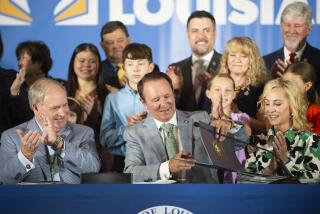High Court Rules Out N.J.’s Silent Moment by Students : Other States’ Meditation Laws Are Left Intact
- Share via
WASHINGTON — The Supreme Court today refused to let New Jersey provide daily moments of silence for public school students.
The justices, without deciding the constitutionality of state laws authorizing moments of silence, unanimously ruled that New Jersey legislators who sought to press the controversy in court no longer have the proper legal standing.
Today’s decision left intact a ruling that the New Jersey law violates the constitutionally required separation of church and state by impermissibly encouraging organized prayer sessions.
But the court said nothing about the validity of laws in other states that, like New Jersey law, provide for moments of silence in public schools without mentioning the word prayer.
‘Private Contemplation’
The law, previously invalidated by a federal appeals court, said students may use the silent moments “for quiet and private contemplation or introspection.”
About half the states have similar moment-of-silence laws. Most, like New Jersey’s, do not mention prayer specifically.
But the U.S. 3rd Circuit Court of Appeals ruled that the New Jersey Legislature had intended to promote organized school prayer when it passed the law in 1982.
The New Jersey Legislature initially chose to defend the moment-of-silence law but, after Republicans took over its leadership, said it no longer wished to pursue the case.
Appeal Pursued
However, Alan Karcher, former Speaker of the state General Assembly, and Carmen Orechio, former state Senate president, pressed the appeal.
Writing for the court, Justice Sandra Day O’Connor said the appeal by Karcher and Orechio must be dismissed because they no longer represent the Legislature’s leadership.
The Supreme Court in 1985 strongly reaffirmed its 1962 ban on organized prayer in public schools by outlawing daily moments of silence if students are encouraged to pray during that time.
In that ruling, the court voted 6-3 to strike down an Alabama law that allowed such periods for “meditation or voluntary prayer.”
But the justices indicated in the Alabama case that some moment-of-silence laws may be valid--if they do not mention prayer and if state legislators did not intend to endorse or promote organized prayer sessions.
Opportunity for Prayers
The Reagan Administration told the justices in the case decided two years ago that moment-of-silence laws like Alabama’s “enhance the opportunity for students to include silent prayers as part of their activities at school” and should be allowed.
President Reagan favors a constitutional amendment that would, in effect, undo the high court’s 1962 decision on school prayer.
More to Read
Sign up for Essential California
The most important California stories and recommendations in your inbox every morning.
You may occasionally receive promotional content from the Los Angeles Times.










